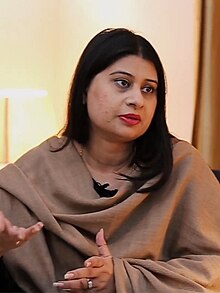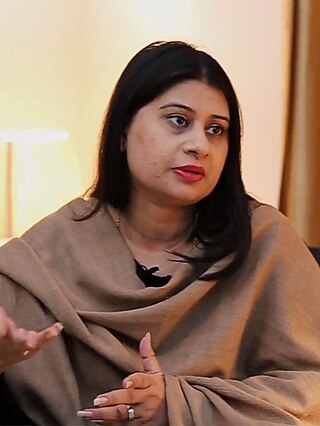Amna Mufti
Pakistani screenwriter and columnist From Wikipedia, the free encyclopedia
Amna Mufti (Punjabi, Urdu: آمنہ مفتی) is a screenwriter, columnist and author from Pakistan. She has written more than five novels and more than twenty television series. Her accolades include a Lux Style Award and a PEN Award.[1][2]
Amna Mufti | |
|---|---|
 Mufti in 2021 | |
| Born | Lahore, Punjab, Pakistan |
| Occupation | |
| Language | Urdu |
| Nationality | Pakistani |
| Education | University of the Punjab |
Early life
She spend her childhood in a remote village near the Sutlej River.[1] Since her childhood, she wanted to become a scientist being inspired by Marie Curie and had no inclination towards writing.[3] She used to write poems in her school and college days and composed her first verse at the age of six.[1] She sent her ghazals to Ahmed Nadeem Qasmi who rejected it and motivate her to write novels instead of poems.[4]
Personal life
Mufti is a professor at Punjab University, Lahore.[5] In 2023, she shifted to UAE on receiving the golden Visa.[6]
Career
Summarize
Perspective
As an author
She wrote her first short story Phir Wohi Dasht which was published in Adab Dost in 1998. It was published in Adab Dost in May 1998.[4] In 2020, her novel about the water crisis Pani Mar Raha Hai was published.[3]
As a screenwriter
She made her debut as a screenwriter in 2012 when she approached Babar Javed and wrote Ek Hatheli Pe Hina Ek Hatheli Pe Lahoo.[3] She then gave the idea of another series based on dowry problems in Pakistan which was accepted readily and she wrote the Jahez resultantly which aired on Geo Entertainment in the same year.[3] For the series, she received her first Lux Style Award nomination as a Best Television Writer at the 12th Lux Style Awards.[7]
In 2013, the adaptation of her short story Ullu Baraye Farokht Nahi was aired on Hum TV for which she wrote the screenplay as well. The series was directed by Kashif Nisar and Mufti received critical acclaim for her script and Best Television Writer Award at the 13th Lux Style Awards. The script of the series was later made available as a book.[4][8]
In 2017, she adapted the Amrita Pritam's 1950 novel Pinjar for television which broadcast on TV One as Ghughi. Amar Khan and Adnan Siddiqui played the leads in it and Mufti was nominated for Best Television Writer at the 18th Lux Style Awards.[9][10]
In 2018, she wrote Aakhri Station deals with issues such as such as women's rights, mental and health hazards, acid attacks, forced prostitution, and domestic violence. The series was directed by Sarmad Khoosat and produced by Kashf Foundation.[9]
Based on several social evils such as child abuse sex trafficking, she wrote Dil Na Umeed To Nahi which was directed by Kashif Nisar and produced by Kashf Foundation. Mufti received her fourth nomination as a Best Television Writer for the series at the 21st Lux Style Awards.[11]
Influence
Mufti is influenced by Qurratulain Hyder and Altaf Fatima in writing.[1][9]
Publications
Screenwriting
Television
- Ek Hatheli Pe Hina Ek Hatheli Pe Lahoo (2012)
- Jahez (2012)
- Sabz Pari Laal Kabootar (2012)
- Maya (2012–14)
- Ullu Baraye Farokht Nahi (2013)
- Dil Muhallay Ki Haveli (2014)
- Rukhsati (2014)
- Izteraab (2014)
- Haq Meher (2014–15)
- Neelam Kinaray (2015)
- Jugnoo (2015)
- Mol (2015)
- Farwa Ki ABC (2015)
- Preet Na Kariyo Koi (2015–16)
- Jab Tak Ishq Nahi Hota (2016)
- Ghughi (2018)
- Aakhri Station (2018)
- Zun Mureed (2018)
- Dil Na Umeed To Nahi (2021)
- Khushbo Mein Basay Khat (2023)
Film
- Khaemae Mein Matt Jhankain[10]
Awards
Lux Style Awards
Other accolades
- 2006—PEN Award for Best Debut[1]
References
Wikiwand - on
Seamless Wikipedia browsing. On steroids.
